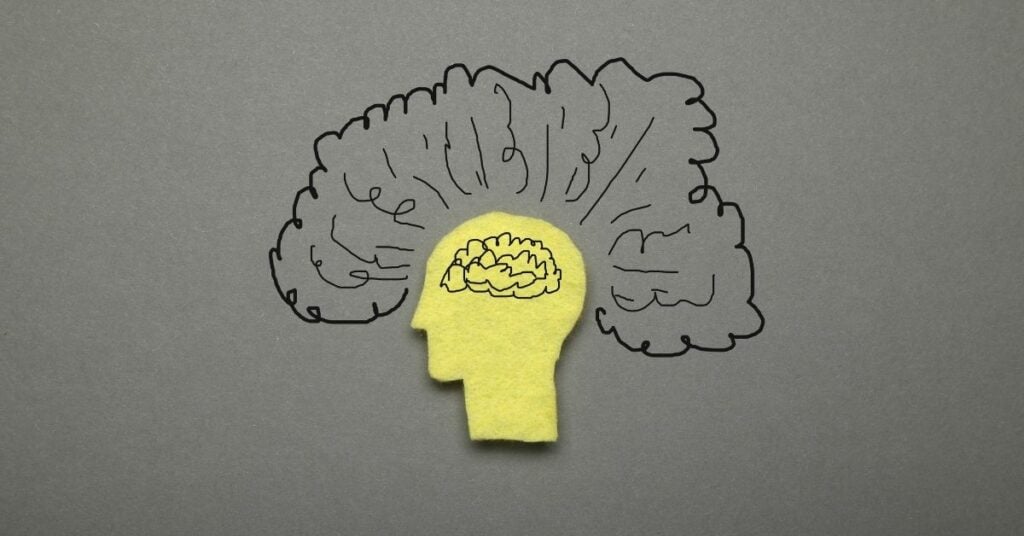How to calm down during a panic attack
Reviewed by Robert Bogenberger, PhD


The first time I had a panic attack, I didn’t know I was having one. I was sitting on a tour bus in the Cayman Islands with my family, about to leave for a day trip.
Having just recovered from a 24-hour flu I’d caught onboard our cruise ship, I was still weak, a bit woozy—and very afraid of feeling nauseated on the bus. With that thought, I suddenly felt intense anxiety rush through my body. I began to lose control of my breathing. I was certain I would start hyperventilating and pass out.
The feeling passed after a few minutes, and I carried on like nothing had happened. It took me years to realize I’d experienced my first panic attack that day.
How to spot a panic attack
On that family vacation at age 21, I’d heard of panic attacks, but I didn’t know what they looked or felt like. Years later, while researching the topic for a professional project, I learned about the telltale signs:1
- Rapid heartbeat
- Shortness of breath
- Chest pain
- Hot flashes or cold sweats
- Dizziness
- Nausea
- Shakiness
Anxiety attack vs. panic attack
I thought I’d had anxiety attacks before. But then I found out there isn’t really such a thing as an anxiety “attack”—it’s just regular anxiety. Because everyone experiences anxiety differently, there’s no diagnostic definition for that type of attack.
A panic attack is a sudden and much more intense episode of anxiety. Anxiety is usually triggered by something, but a panic attack can come out of nowhere.
Anxiety and panic attacks have similar symptoms, but panic attacks can make you feel like you’re losing control of your brain and body. If this happens to you frequently, or you find yourself worrying about when it might happen again, that may be a sign of panic disorder.2
5 ways to calm down during a panic attack
I’m lucky my first panic attack lasted only a few minutes and went away on its own. Panic attacks tend to peak within 10 minutes, but for some people, they can last for hours. If you ever find yourself having one, here’s how to help calm yourself down.
4-4-4 breathing
Deep breathing is one of the best things to do when you feel stressed.3 The 4-4-4 breathing method, also known as box breathing, uses increments of four seconds as follows:
- Close your eyes.
- Exhale completely through your nose.
- Inhale through your nose for four seconds.
- Hold your breath for four seconds.
- Exhale through your nose for four seconds.
- Repeat.
Another option is the 4-7-8 breathing method, which follows the same steps—except you hold your breath for seven seconds and exhale for eight. The slightly longer hold and exhalation may help you feel more relaxed.
Relax your muscles
Anxiety and panic can cause you to tense up and feel even more uncomfortable. By relaxing your muscles, you can help reduce some of the physical symptoms of anxiety.4
Try this progressive muscle relaxation technique, starting at the top of your head and working your way down:
- Tense the muscles in your face, including your jaw, eyebrows, and forehead.
- Hold for five seconds.
- Loosen your facial muscles and let go of the tension.
- Next move down to your neck and shoulders. Tense the muscles by shrugging your shoulders up to your ears.
- Hold for five seconds.
- Let go of the tension and feel the muscles relax.
- Continue down your body, tensing and relaxing each muscle group for five seconds before moving on to the next: arms, chest, stomach, legs, and feet.
- Once you’ve gone through all the muscle groups, take a deep breath and let your whole body relax.
It may seem strange to tense up on purpose right before or during a panic attack, but it really does help your muscles relax. Try practicing this tactic when you’re not having an attack, so when you sense one coming on, you’ll be better prepared to release tension and calm yourself down.
Move your body
Sitting or standing still during a panic attack can make your symptoms feel worse. Getting up and moving—even if it’s just pacing back and forth for a few minutes—can help you feel more in control.5
If you can, go for a walk outside or do some light stretching. Taking yourself out of the environment that’s causing your anxiety may also help ease your symptoms.
If you feel a panic attack coming on when you’re somewhere you can’t get up and move, like a bus or a plane, try these basic hand movements to help ground yourself and reduce the intensity of the attack.
- Clench and unclench your fist
- Rub your hands together
- Place the palms of your hands in prayer position and push them against each other
- Tap your fingers on a hard surface
Doing something with your hands can help take your mind off anxiety and refocus it elsewhere. The movement might also help release some of the physical tension you’re feeling.
Focus on an object
When you’re in the middle of a panic attack, it’s hard to think about anything else. But if you can find another focal point, it may help take your mind off your symptoms and calm you down.
Look for something in the room that you can fix your gaze on: a picture on the wall, a pattern in the carpet, a crack in the ceiling. Once you pick your focal point, concentrate on it intently and try not to let your mind wander.
If you wear a watch with a dial, try this technique:
- Look at your watch and pick a spot on the dial.
- Without taking your eyes off that spot, mentally trace the shape of the numbers around it.
- Once you’ve gone all the way around, start over and trace the shape again.
- Repeat until your panic attack subsides.
Focusing on an object is another way to help take your mind off what you’re feeling. The repetitive tracing can be soothing and help ease panic attack symptoms.
Repeat a mantra to yourself
A mantra is a phrase you repeat to yourself over and over. It can be something as simple as “I am calm” or “This will pass.”
Saying the mantra out loud can help, but if you’re in a public place and don’t feel comfortable with that, just say it silently to yourself. Make sure to enunciate the words clearly in your mind.
You can also try this similar strategy:
- Pick a word with personal meaning to you, like “love” or “peace.”
- Repeat the word over and over, out loud or silently, until the panic subsides.
- Be sure to enunciate each syllable clearly.
Repeating a mantra can help refocus your mind and ease panic symptoms.6 It may also help you feel more in control and less fearful.
How to prevent nighttime panic attacks
Nighttime panic attacks, or “night terrors,” can be especially frightening. They have the same symptoms as regular panic attacks, but they also wake you up and can make it difficult to fall back asleep. Even though night terrors are fairly common, experts don’t really know why they happen.
If you find that your panic attacks strike at night, make sure you’re following a good sleep hygiene routine:
- Create a relaxing bedtime ritual, such as reading, journaling, or meditation.
- Avoid caffeine, alcohol, and other substances before going to bed.
- Eat your last meal of the day at least three hours before bedtime.
- Making sure your bedroom is cool, dark, and well ventilated.
- Take a hot shower or bath before going to bed.
How to get help
As someone who understands firsthand how debilitating panic attacks can be, I want you to know there’s no shame in reaching out for help. A mental health professional can help you understand your anxiety and develop coping mechanisms to deal with symptoms. Some medications can also be effective at treating anxiety and panic disorders.
Visit our directory to find a licensed therapist near you.
Sources
1 https://www.nimh.nih.gov/health/publications/panic-disorder-when-fear-overwhelms/
2 https://www.nimh.nih.gov/health/publications/panic-disorder-when-fear-overwhelms/
3 https://www.ncbi.nlm.nih.gov/pmc/articles/PMC5455070/
4 https://www.ncbi.nlm.nih.gov/pmc/articles/PMC8272667/
5 https://www.ncbi.nlm.nih.gov/pmc/articles/PMC6064756/
6 https://pubmed.ncbi.nlm.nih.gov/28271341/
About the author
Elise Burley is a member of the therapist.com editorial team. She has more than a decade of professional experience writing and editing on a variety of health topics, including for several health-related e-commerce businesses, media publications, and licensed professionals. When she’s not working, she’s usually practicing yoga or off the grid somewhere on her latest canoe camping adventure.
Related articles

Anxiety attacks: Symptoms, causes, and treatments
Anxiety attacks can have a negative impact on those who experience them, but...